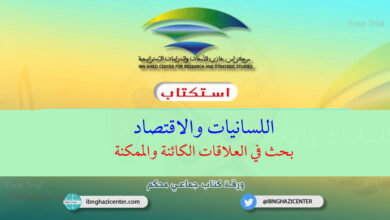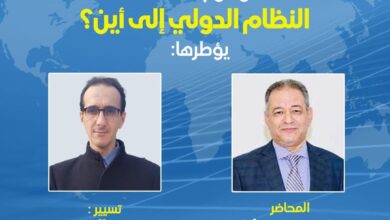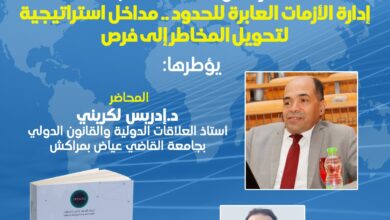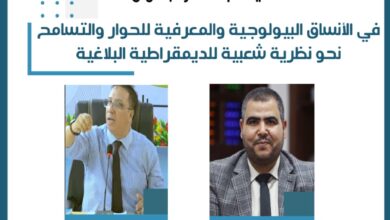Brief Report on the International conference: Robert Fisk: a legacy of a Human Conscience
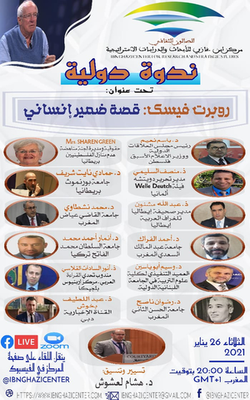
The IBN Ghazi Centre for Research and Strategic Studies organised an international virtual symposium entitled “Robert Fisk: a Story of a Human Conscience” on Tuesday, the 26th of January 2021.
A group of journalists, academics, researchers and human right activists from around the world presented their testimonies about the late Robert Fisk and his work. This symposium was chaired by Dr. Hicham lachouche who welcomed the participants as well as the audience. He then gave a brief introduction in which he highlighted the reasons GCRSS is organising in recognition of the international renowned reporter and writer Robert Fisk.
The first speaker was Mrs. Sharen Green from Britain, a journalist and human rights activist. For Sharen, Fisk was always at the side of the victims, he recounted the suffering of the victims of wars, and yet he was a peace advocate. Mrs. Sharen Green quoted Robert Fisk saying: “The press must challenge authority, especially when governments and politicians take us into war.”
The second speaker was Dr. Hammadi Nait-Charif from Bournemouth University, UK, who discussed how the death of Fisk was reported in the western media. Overall Fisk was celebrated as a reporter who was determined and committed to uncovering the truth and reality at all costs; however, the western media repeatedly branded him as a controversial because of his reporting on the American and Israeli policies in the Middle East.
Then came the intervention of the journalist Moncef Al-Selimi from Germany under the title “Robert Fisk, a great journalist on the border line”. For Moncef, Robert Fisk was an exceptional journalist with a long experience reporting from war/conflict zones. However in some cases Fisk can deviate from his rigorous reporting especially when the conflict has ideological dimensions such the Syrian conflict where he appeared to side with Syrian regime.
Dr. Bassem Naim, Assistant Secretary-General of the Arab Doctors Union, from Palestine discussed the “Western journalism between principles and interests: Robert Fisk as an example”. In his talk, Dr Naim stressed the strong interest Robert Fisk showed in the Palestinian cause through the number of reports, articles and books he authored during his long career as a Middle East reporter. For Dr. Naim, although Fisk was a distinguished reporter who remained true to his principles, he crossed many red lines in the way he reported on the Middle East.
Dr. Anmar Ahmed Muhammad, a professor at the Faculty of Islamic Sciences at Sultan Mehmed Al-Fatih University in Istanbul, discussed how Fisk reported about Iraq. He highlighted the objectivity and credibility of Fisk as he reported on the painful and devastating reality in Iraq. He quoted Robert when he said “there is no excuse for anyone” and we cannot just say we “did not know and no one told us.”
Then Dr. Wassim Abu Yassin, executive dean of the Faculty of Education, Lebanese International University, spoke about “Robert Fisk, a journalist who did justice to the Middle East, using Lebanon as an example”. Wasim Muhammad said that Robert Fisk he was not a typical western journalist as he criticised the Western policies in the Middle East. Fisk was on the ground reporting on the Lebanese war and the invasions of the Zionist enemy. He was the first to report of the Sabra nad Shatilla massacre. In Fisk wrote a book about Lebanon published in 1990 titled ” Pity the Nation: Lebanon at War “, where he tells the story of the horrors that he saw in war-torn Lebanon in the 1970s and 1980s.
Then Dr. Mohamed Nachtaoui from Morocco, the director of the research group on international human rights law, who discussed “Robert Fisk and the Palestinian Cause.”
Dr. Nashtawi commended the ability of Robert Fisk to understand the reality of different conflicts in the region. He adds that Robert Fisk is well known for siding with the victims and was a witness with distinction to the area who provided objective reports.
Dr. Ahmed Al-Farrak, a professor of philosophy at the University of Abd al-Malik Al-Saadi, Morocco, entitled his talk “Robert Fisk and the Responsibility of the West for the War”. He commanded Robert Fisk for his ethical and intellectual integrity, and positive independence in which Robert Fisk expressed strong views about who was responsible for the region’s wars and conflicts. Dr. Al-Farrak concluded that reporting the true suffering of the peoples upon whom the war was imposed is a very noble task, especially at the level of investigative media.
Then came the intervention of Professor Abdullah Mashnoun, journalist and head of the Islamic Organization in the Arab World and Europe, who spoke about “Robert Fisk, a journalist, an intellectual and a humanist”. In this talk, he claimed that observers consider Robert Fisk to be the most famous western foreign correspondent during the past 30 years due to his reporting on most conflicts in the Middle East including: the civil war in Lebanon, the revolution in Iran, the Iran-Iraq war, the first Gulf War and the invasion of Iraq in 2003, and the Gaza Strip massacre in 2008 and 2009. His reports earned him many accolades including being named the ‘international journalist of the year’ by the British Press Awards seven times.
Mr Anwar Sadat Al-Qalasi, a journalist from Belgium, discussed “the Role of the Media in Changing the Political Map in the Middle East”. Mr Al-Qalasi said that Robert Fisk is one of the most prominent writers to have done justice to Arab causes, and was one of the greatest journalist working on the ground to report on the horrors of wars. For Mr Anwar, Fisk was a excellent journalist who worked tirelessly to report the truth with bravery and honesty. A documentary film was produced about Fisk that showed how he handled Arab issues and how he covered the crises that unfolded in the Middle East. It showed how experienced and familiar he was with the political reality in the region.
The talk that followed was by Dr. Nasih Radwan, a professor at the Faculty of Arts and Humanities, Casablanca, entitled “Robert Fisk is the Icon of Committed Journalism”. Dr. Nasih Radwan commanded this conference be a memorial and tribute to what the late Robert Fisk accomplished as a reporter and writer. He said that by mentioning Robert Fisk, we evoke the history of wars, massacres, pains and tragedies suffered by so many in the Middle East, Afghanistan and Bosnia and Herzegovina. For Dr. Radwan, Fisk was a reliable source who reported on thorny issues leaving the reader the freedom to interpret and take an ethical or political position for themselves.
At the end of this seminar, two video testimonies about Robert Fisk were presented. The first was by Professor Ikram Nazoni from Spain, an NGO activist, and the second by Professor Mohamed El Hafi, a theatre and film director residing in Germany.
At the end of the seminar, Dr. Hicham Lachouche thanked all the participants and attendees for honouring the late Robert Fisk by their participation.



